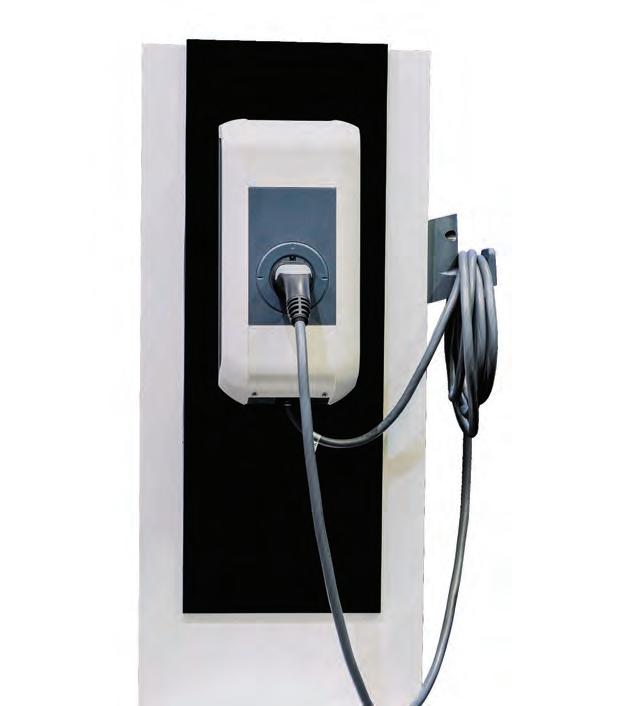
3 minute read
Working with the City – CLIMATE CHANGE AND RESILIENCY
On the environmental front, Burlington Hydro has taken on important responsibilities as a primary stakeholder on the City’s Climate Action and Resiliency Plan Committees. It is an important role - not only in how it relates to the company’s future - but the impact it has on the wider community. Preparing the distribution system for more frequent and severe weather events or ensuring that our power supply will meet the needs of vehicle electrification and thermal energy are some of the issues underpinning these responsibilities.
Climate Action Plan (CAP)
Advertisement
The City of Burlington has set a goal in its Strategic Plan to work towards being a net carbon neutral community by 2050. As such, the City approved a Climate Action Plan (CAP) in 2020 to act as the pathway to achieving this goal, with a focus on mitigating greenhouse gases (GHGs) and reducing energy consumption. Electric Vehicle (EV) proliferation, conservation activities, district energy, microgeneration and storage technologies are some of the issues being explored. Burlington Hydro is a proud supporter and partner of the CAP Stakeholder Committee, providing expertise and industry insight with its implementation.
In support of this role, BHI will prepare a ‘Climate Sustainability Plan’ in the coming year. It will provide a pathway that supports the transition away from the use of fossil fuels through electrification, as well as assessing the impact of climate change on the distribution grid. The plan will be submitted as part of the ongoing evolution of CAP.
Climate Resilient Burlington (CRB)
Approved by City Council in July 2022, CRB is a 10-year City action plan to prepare for warmer, wetter, and wilder weather brought about by climate change. In many respects, it is a companion piece to CAP. Burlington Hydro participated on the stakeholder committee, providing input into the plan’s development. The resiliency of the distribution system to withstand the increase in severe weather events is an important theme in CRB. From major outage reports to tree trimming activity and self-healing grids, BHI’s support comes on a number of important levels.
Preparing for the Proliferation of Electric Vehicles
The Government of Canada plans to eliminate combustible engine-run cars and light trucks by 2035 as part of its net-zero emissions goal to limit further global warming. Electric Vehicles (EVs) are an energy efficient transportation choice that can reduce a car owner’s greenhouse gas emissions by 70%.
The transition from fossil fuels to transportation electrification is an important aspect of the City’s Climate Action Plan. BHI will need to accommodate and plan for increased demand on its system as EV charging becomes more commonplace. This planning is already well underway and will be an important focus of BHI’s ‘Climate Sustainability Plan’.

EV Charging Stations
Burlington Hydro’s unregulated affiliate - Burlington Electricity Services - expects the demand for EV Chargers in multi-unit residential buildings to grow exponentially over the next two years. Interest in BESI’s Managed EV Charging Program remained strong in 2022. Charging station installation agreements are in progress with 14 new buildings, while Bridgewater, Paradigm and Bunton’s Wharf condominiums have all signed on.
BESI EV charging station solutions come with the benefit of the latest in charging station technology. The charging stations are a leading-edge, made-in-Canada option that’s connected to Burlington’s premier future focused EV Network. Moving into 2023, activity is expected to remain brisk.
What’s in a CHARGE?
LEVEL 1 CHARGERS:
All EVs come standard with a cord set that lets you charge the battery using a regular wall socket, also known as Level 1 or 110 volts charging. It can take 8 to 20 hours to fully charge an EV at Level 1 depending on the battery level of charge. One hour of charge gives approximately 8 kms of range.

LEVEL 2 CHARGERS:
Level 2 charging stations use a 240-volt system (like a clothes dryer or stove plug) and can fully charge a battery electric vehicle in about 4 to 8 hours and a plug-in hybrid in about 1 to 4 hours depending on the battery level of charge. One hour of charge gives approximately 30 kms of range.
LEVEL 3 CHARGERS:
One hour of charge give approximately 250 kms of range. Charging EVs during Time-of-Use (TOU) off-peak time periods is more energy-efficient and cost effective (7 pm to 7 am on weekdays, and all day on weekends).










